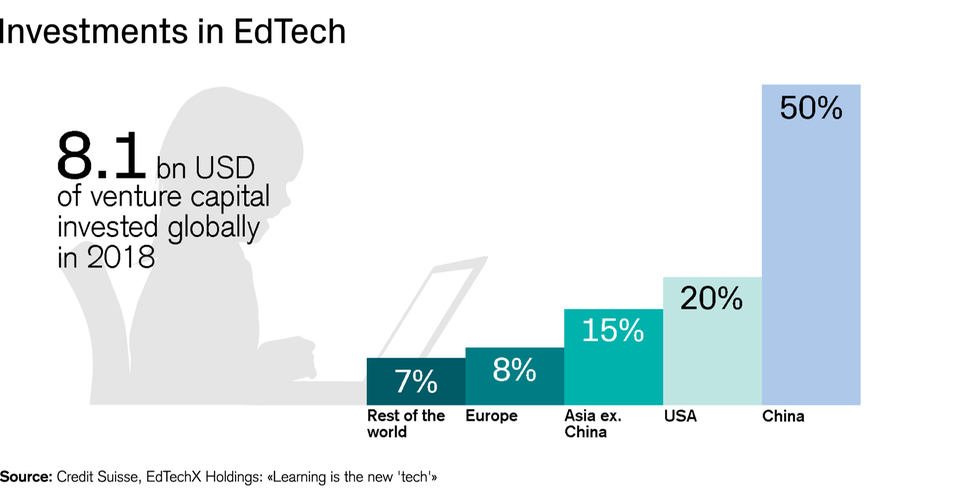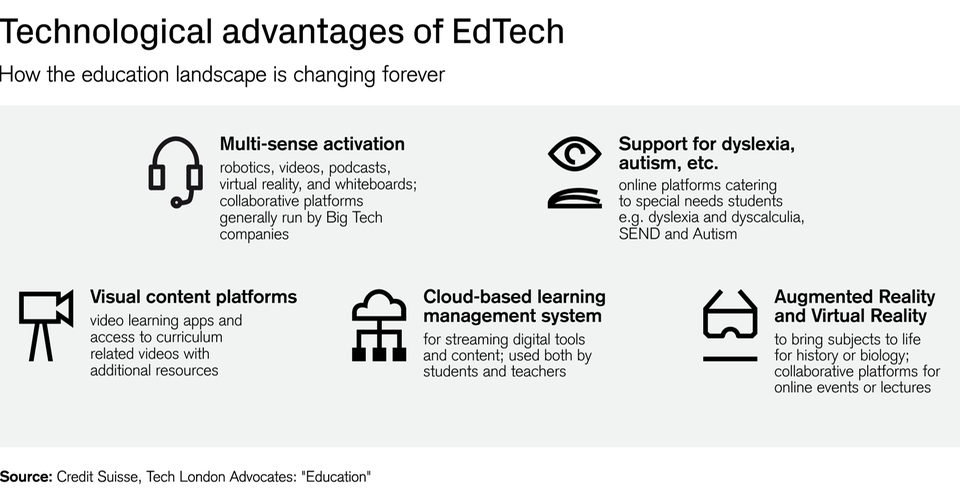Written by: Credit Suisse | Credit Suisse
Education technology (EdTech) is one of the few industries experiencing a sharp upward demand, reinforcing its potential for profitability and the role it can play in societal wellbeing.
The global spreading of the coronavirus (COVID-19) has required drastic regulations in an effort to contain it. One of the first compulsory measures taken by affected countries has been the closure of all schools.
The sudden adjustments of educational processes and altered dynamics between all involved parties - schools, teachers, students and parents – are challenging familiar routines and threatening crucial public objectives. Accordingly, the World Bank has commissioned its EdTech expertise team[1] to support policymakers worldwide in facilitating the continuation of basic education by adapting to modern technologies.
EdTech is essential and not just a luxury of the future
EdTech's practical value has hence rapidly improved from its pre-pandemic standing: Previously considered an option for quality education and a supplement to traditional schooling systems, it is now essential for preserving a progressing society.

Institutions previously working with digitalized education platforms have already benefitted during the COVID-19 crisis from their contemporary approach. These schools smoothly mastered the sudden transition to homeschooling, easing the adjustment process for students and parents. Their early investment in equipment and software and in coaching of educational staff has allowed them to continue their operations with minimal interruption.
EdTech is profitable and delivers crucial social benefits
Investors have long identified the windows of opportunity offered by technology in the classrooms.

However, its recent unprecedented expansion highlights even more its sustainable profitability:
"So far only 2 to 3% of the 5 trillion USD spent globally on education is digital. This, combined with EdTech's sudden vital role during COVID-19 and the significant differences seen up to now in its geographical investments, intensify the previously unseized global growth opportunities" ~ says Dr. Kirill Pyshkin, Fund Manager at Credit Suisse Asset Management.
Furthermore, Dr. Pyshkin stresses how investing in EdTech has a powerful positive socio-economic impact which supports the UN's fourth Sustainable Development goal:
"Because education is directly linked to the global reduction of poverty and to the prevention of children exploitation, EdTech plays an important role in society by improving access to education even in the most remote places."
EdTech will continue revolutionizing learning
EdTech will keep growing as one of the fastest sectors in digital transformation. Its ability to collect and harness Big Data brings further innovation potential to improve the technology while benefitting students.
For example, skeptics of digital education are concerned about the limited social interaction it offers. A life in isolation can be detrimental, and education should help students develop soft skills such as creativity and empathy. As a response, newer digital applications now broaden the social educational spectrum by recreating the classroom experience virtually, allowing group learning, team breakout sessions, and online project collaboration.
“"EdTech is developing, disrupting and being adopted so fast in current times that it could change the education landscape forever" ~ says Joanna Tasker, expert on education for Tech London Advocates.

EdTech is expected to keep the momentum after COVID-19
Globalization will keep bringing new opportunities and challenges to humans – conditions in which EdTech has strongly thrived and offered solutions to complex situations. Hence, experts agree that this sector's importance during COVID-19 foretells its fundamental integration into most learning forms in near future.
Related: Why Advisors Need to Appreciate Their Clients’ Situation Outside Analytical Assessments

